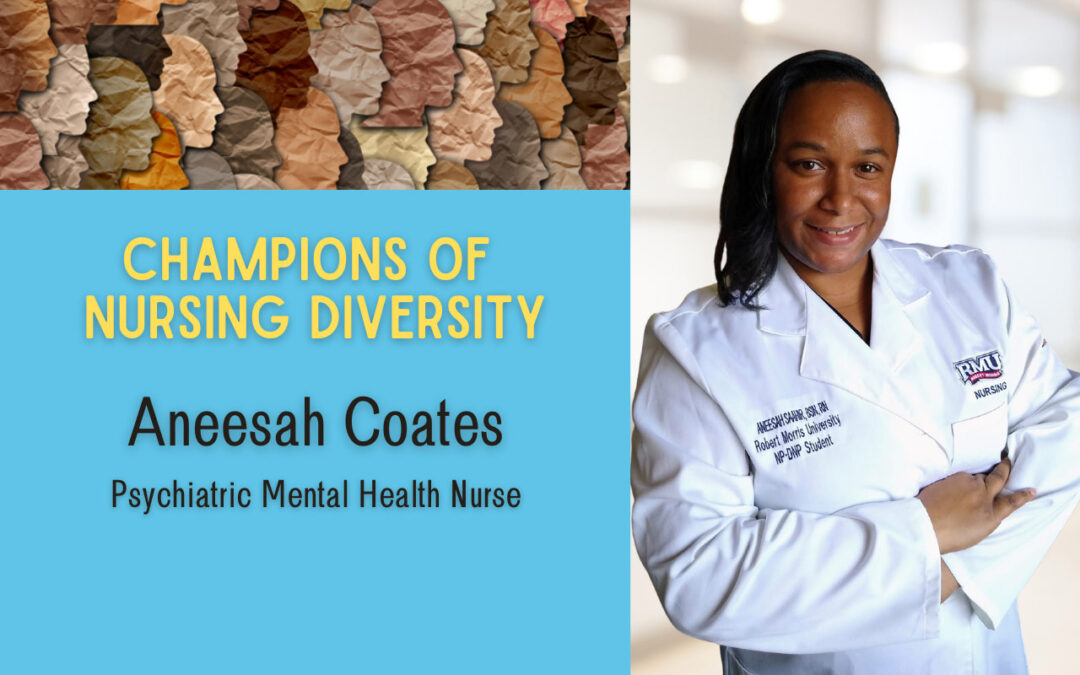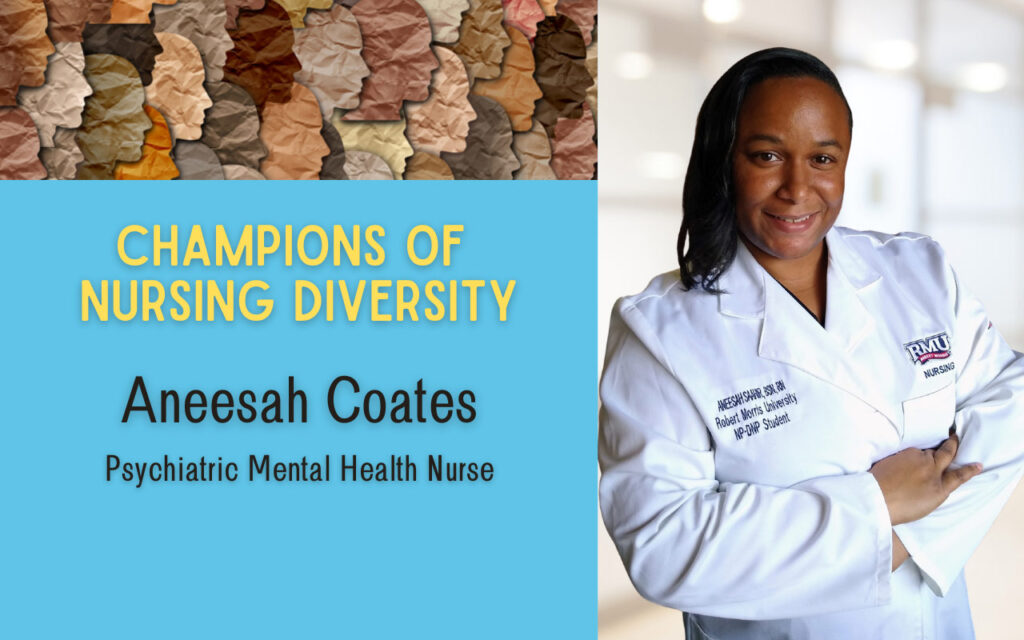Aneesah Coates, BSN, RN, is an experienced psychiatric mental health nurse with nearly ten years of experience in acute care, long-term care, and home health care. She is the owner of aneesahcoates.com and is passionate about helping nurses, current and aspiring, learn more about the profession.
Coates works at a mental health crisis center as a senior professional evaluation nurse, preceptor to new nurses, Nursing Journal Club facilitator, and nursing department trainer for new staff. She’ll graduate with her doctorate in nursing practice as a psychiatric mental health nurse practitioner in December 2023.
Coates is an important nursing leader, and we’re pleased to profile her as part of the Champions of Nursing Diversity Series 2023.
The series highlights healthcare leaders who are prominent figures in their organizations and are making transformational impacts in nursing.
Meet Aneesah Coates, BSN, RN, and senior professional evaluation nurse.
Talk about your role in nursing.
I wear several hats in my current nursing role. I am a senior professional evaluation nurse at a local mental health crisis center. We’re part of the University of Pittsburgh Medical Center, specifically under the Western Psychiatric Hospital umbrella, a national leader in diagnosing, managing, and treating mental health and addictive disorders. And we are located in an urban community setting, so we get consumers with various needs and diagnoses.
My duties include triaging consumers coming into the center, conducting intake assessments, making referrals to the appropriate level of care, and working with local pharmacies to ensure that our consumers can access the medications they need. I also serve as a resource for other nurses and clinicians in the facility, providing mentorship and guidance to new staff members and helping with problem-solving when necessary.
More formally, I am trained as a preceptor to new nurses, so I help lead nursing orientation and provide ongoing support during the onboarding process. As the trainer for the nursing department, I give presentations to new staff from all disciplines, providing them with an overview of the nurse’s role within the team. My goal is to ensure everyone who works here understands our role as nurses and how we fit into the team’s overall approach to helping our consumers.
Lastly, I serve as the Journal Club facilitator for the nursing department. I started this initiative by creating a presentation to refresh us on defining key research terms and levels of evidence. Every month, I select a journal article relevant to our work, conduct an article critique, and provide the group with a summary of the main findings. I also provide them with a blank copy of our research critique form and encourage them to reply to the initial email to share their thoughts to foster discussion. Each of my roles has this common thread of support for consumers and staff alike and empowering everyone in the process.
How long have you worked in the nursing field?
This year marks a decade as a nurse for me.
Why did you become a nurse?
Becoming a nurse was a natural progression for me. Seeing my dad in the hospital greatly impacted me as a child, and I was continually inspired by the nurses who cared for him. Despite being in and out of the hospital, my dad was involved in my education and invested a lot in my early education. He nurtured my curiosity and encouraged me to keep learning. My mother’s hard work ethic was also an influence on me.
Between their encouragement and my growing interest in healthcare, nursing seemed the perfect fit. I was drawn to all aspects of the profession and wanted to make a difference with my work. That desire has only grown since then, and I’m continually driven to learn more and improve my practice.
What are the most important attributes of today’s nursing leaders?
A great attribute for today’s nursing leaders is being able to role model the behaviors and attitudes they’d like to see in their staff. Nursing leaders should be able to demonstrate qualities such as professionalism, accountability, and integrity. It’s also important that nursing leaders are problem-solvers and innovators, ready to take on challenges and come up with creative solutions for their teams. Nursing leaders should strive to be lifelong learners and stay current on best practices and evidence-based research to improve care.
Many attributes that contribute to successful nursing leadership can be learned and developed over time. So if an aspiring leader still needs to possess the desired qualities, they can acquire them through professional development opportunities such as certifications and continuing education. Mentorship and networking can also be great resources for learning and developing these skills.
What does being a nursing leader mean to you, and what are you most proud of?
Being a nursing leader means taking an active role in helping shape healthcare’s future. It’s about understanding how my work can impact the lives of my patients, their families, and our community. It’s about being an advocate for all those I serve and working to ensure that everyone has equal access to healthcare. It’s also about empowering my colleagues, mentoring them, and encouraging them to reach their potential as healthcare professionals. And this can all be done no matter what level of nursing leadership you are in.
I take my leadership role very seriously. I am continuing my education to obtain my doctorate in nursing practice (DNP) to become a psychiatric mental health nurse practitioner (PMHNP). I plan to graduate this December and am excited about the opportunities this degree will bring. I am also excited about the work I have done to create aneesahcoates.com, a website devoted to helping students and new and seasoned nurses navigate the world of nursing by providing access to resources and insights on a variety of topics.
Tell us about your career path and how you ascended to that role.
My career path in healthcare began 20 years ago as a dietary aide in a hospital cafeteria. My nursing career started sometime after that when I decided to attend a local community college and obtain my associate’s degree in nursing science. From there, I went to the California University of Pennsylvania for my bachelor’s degree in nursing. And three years ago, I entered Robert Morris University’s BSN-DNP program to become a psychiatric mental health nurse practitioner. As a nurse, I have worked in an acute care setting caring for lung transplant patients. I have also worked in skilled nursing, home health care, long-term care, and psychiatric mental health care.
What is the most significant challenge facing nursing today?
The most significant challenge facing nursing today is the shortage of nurses (source). The nursing shortage results from multiple factors, including low enrollment in nursing programs, a lack of nursing school faculty, and a significant segment of the nursing workforce nearing retirement age. Not to mention how the pandemic has put an even more tremendous strain on the nursing profession. And the shortage is likely to have several downstream effects, including a strain on staffing ratios, leaving nurses overworked and stressed out, which can lead to nurse burnout. This can negatively impact patient outcomes and the quality of patient care. To address this, we need to focus on initiatives such as recruitment and retention programs and professional development opportunities that focus on building leadership skills. We should also continue to invest in incentives such as tuition reimbursement and scholarships to encourage more people to enter and stay in the profession.
These initiatives can create a pathway for nurses to move up the ladder, which not only increases retention but also helps to foster an environment of strong leadership among nurses. I don’t want to minimize the challenge the nursing shortage presents. It’s a complex issue that requires innovative solutions and collaboration between multiple stakeholders.
As a nursing leader, how are you working to overcome this challenge?
I am working to overcome this challenge by engaging in various initiatives and activities to help recruit, retain, and mentor nurses. I am doing this through my website, which provides essential nursing resources to students and new nurses looking to enter the profession. My current professional role allows me to precept students and new nurses, allowing me to share my passion and excitement for the profession. I make it a point to express how nursing is a dynamic profession that can be whatever we make it. In the future, I plan to use the knowledge I have gained through my DNP program to contribute to initiatives and programs that will empower nurses through education and advocacy.
I am interested in health economics and policy, so we’ll see what opportunities open up.
What nursing leader inspires you the most and why?
Nurse Alice Benjamin inspires me. She does so much that you can’t help but be inspired by her. Nurse Alice has achieved so much in her career and is passionate about helping others do the same. She is a leader who uses her platform to promote health and wellness while advocating for nurses and patients. Nurse Alice is a force of positivity, and her passion for nursing is contagious. She’s an author, TV medical contributor, ambassador for the American Heart Association, Chief Nursing Officer at Nurse.org, and the list goes on. Her work goes beyond the traditional boundaries of nursing leadership, and she is an excellent example of how nurses can impact healthcare through direct patient care and advocacy.
What inspirational message would you like to share with the next generation of nurses?
My inspirational message to the next generation of nurses is this: the sky is truly the limit. You can make a real difference in healthcare and positively impact the lives of those who need it most. Believe in your professional abilities, stay true to your values, and don’t be afraid to push the boundaries of being a great nurse.
Is there anything else you’d like to share with our readers?
I want to remind readers that we all have the power to make a difference in the healthcare field and that each of us has unique skills and talents that we can use to help others. No matter what role you play in healthcare or how much experience you have, your contribution matters. So stay motivated, focus on the task at hand, and always remember why you decided to pursue a career in healthcare in the first place.
- Meet a Champion of Nursing Diversity: Kendra Coles - April 3, 2024
- Meet a Champion of Nursing Diversity: Barbara Bosah - March 13, 2024
- Tune Into New Podcast Series: Conversations About Health Care Delivery in the United States - March 7, 2024




